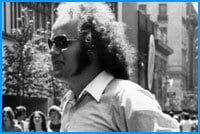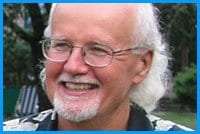
BACK IN THE DAY. Allan Sparrow, who died in April at age 63, worked to further queer rights during his three terms as an alderman in the 1970s.
Friends and supporters will be honouring the late Allan Sparrow, a pioneer for gay-positive relations at City Hall, at a memorial party on Fri, Sep 5.
“Initially he didn’t want anything,” says Sparrow’s friend and business partner Marc Brien. “He eventually changed his mind but said, ‘If there’s going to be any kind of memorial, it has to be fun and upbeat.’ He didn’t want anything tearful.”
Sparrow, who died in April at age 63 after a long battle with colorectal cancer, served three terms as alderman on Toronto’s City Council in the 1970s. He represented gay and lesbian interests at City Hall at a time when it was quite controversial to do so and was instrumental in founding the 519 Community Centre and in stopping a road-widening project that would have included the Church-Wellesley neighbourhood, measures Sparrow’s supporters say helped to establish the village as a queer neighbourhood.
“I think, beyond seeing [queer rights] as a fundamental human rights issue, he was also representing his constituents,” says Brien. Sparrow represented what was then Ward 6, which included both existing gay bars along Yonge St as well as the area that would later become the village.
Sparrow declined to run for a fourth term in 1980, setting the stage for George Hislop, the first openly gay politician in Toronto’s history, to run for the seat. Sparrow and his partner Sue Sparrow campaigned heavily on Hislop’s behalf.
With his wild hair and personal credo of “sex, politics and rock ‘n’ roll,” Sparrow was an outspoken character who “was able to mobilize huge numbers of people,” says Dennis Findlay of CommunityAIR, a grassroots group Sparrow formed to oppose the Island Airport expansion.
“You came away with the feeling that, although he might be leading you somewhat on an issue, you were actually the one who was making a difference,” Findlay says.
Sparrow supported the creation of community centres, parkland and housing cooperatives, advocated for tenant’s rights, fought to preserve downtown neighbourhoods and historic buildings like Paul Kane House. He also tackled racism, sexism and homophobia on Toronto’s police force by founding the Working Group on Police/Minority Relations and the Citizens’ Independent Review of Police Activities to press for equal treatment for minority groups in the city.
In the days before his death Sparrow was heavily involved in planning how he would be remembered, from making arrangements for his own post-mortem party to preparing for the posthumous release of his novel Namao: The God of Speed and Death. Sparrow even penned his own obituary — or “auto-bit” as he called it — to counter what he called “the usually well intentioned but often off the mark obituaries that others write about you.”
“I was probably best known as a councillor representing Toronto’s downtown core from 1974 to 1980 who fought rapacious developers, gouging landlords and a xenophobic police force, while simultaneously helping to craft a new city plan,” he wrote in the obit published on the CommunityAIR website and in the Toronto Star.
The list of confirmed attendees for the memorial includes current members of Toronto’s city council like mayor David Miller and city councillor Kyle Rae as well as federal NDP leader Jack Layton and representatives from numerous community associations. Brien says the evening will include a photo slide show of Sparrow’s life and plenty of rock and roll music.

 Why you can trust Xtra
Why you can trust Xtra


